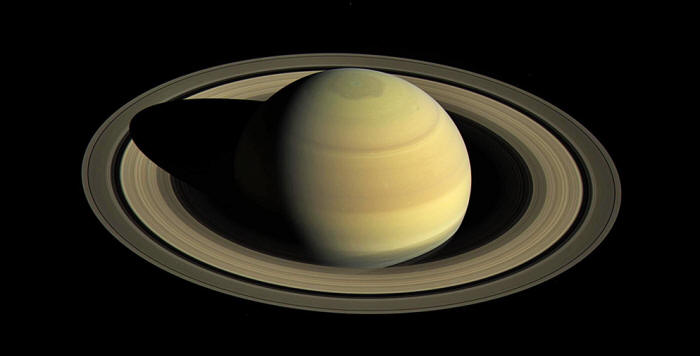|
via
Public Domain / Wikipedia which we associate with laws of nature, require an explanation...
Suppose that you receive five consecutive royal flushes in a game of poker.
What explains this? You
could have received them by chance, but that seems unlikely. A
better explanation is that someone has arranged the decks in your
favor.
A better explanation is that something is responsible for them.
But what...?
We think that's an interesting question but not our present topic. (See our "Further Reading" section below if you want to learn more.)
Similarly, we're not talking about "intelligent design"; we're not asking why well-adapted species exist today. We think that can be adequately explained by citing regularities of natural selection and genetics.
Our question is more general:
Space Science Institute
It's not necessary for God to have all the attributes of a theistic or Biblical God - namely, omnipotence, omniscience, and moral perfection - but only that,
In other words, this argument holds
that regularities in nature are analogous to your winning poker
hands.
A pragmatic reason is about self-interest:
An aesthetic reason is about elegance or beauty:
Similarly, we can think of pragmatic, aesthetic, and even moral reasons why God might want to impose regularities on nature:
And since God is a person, we have reason to think that God might have moral and aesthetic preferences.
Indeed, this would be so even if God were evil or had poor taste, since almost any moral and aesthetic states of affairs require some degree of regularity.
As a result, if you knew that a personal being was about to create a world, you wouldn't be unreasonable in anticipating regularities, even if you knew nothing else about that being.
Well, positing God doesn't really commit us to much more than other explanations of regularity would; they too would posit additional entities.
In their role as scientists, they don't try to explain why there are fundamental laws of nature in the first place.
So if we want to explain why there are regularities as opposed to irregularities - indeed, if we want to explain why science is possible at all - we have to do some philosophy.
If we
were going to explain regularities by positing laws, we'd first have
to say what a law is.
has some important explanatory virtues and that, as a result, it deserves serious consideration as an explanation of
why
there are regularities...
As far as Occam's Razor is concerned, that's no better than positing God.
Now we have yet another interesting phenomenon to explain.
To return to our analogy, it wouldn't be satisfying to say that you got five royal flushes in a row because some mindless law just happened to guarantee that result.
(Why wasn't there a different law, one that generated any one of the octillions of other possible sequences instead? Just a huge coincidence?)
In any case, we say a lot more in our journal
article about why other explanations, such as alternative
philosophical accounts of the nature of laws, don't do a great job
of explaining regularities.
Well, everyone has to posit something, and we can always ask for an explanation of those things.
Because positing God is relatively modest, we think it's more or less on the same footing as positing anything else - maybe no philosophical theory can really explain its fundamental entities.
However, positing God answers a difficult question that other accounts don't:
To posit nothing, or pure, random chance, is modest but doesn't do a good job of explaining:
To posit some mindless explanation that just happened, coincidentally, to give us something as complex and consistent as a regularity does a good job of explaining but isn't really modest:
(For those familiar with Bayesian reasoning, we're arguing that "God" strikes the best balance between prior probability of the explanation and likelihood of the phenomenon to be explained.)
As a result, it
doesn't merely push back the specific problem that concerns us.
ROBERT SULLIVAN via Getty Images
However, we haven't argued,
Instead, we've argued as follows:
And recall, the version of God we've described - simply a person with the power to control whether there are regularities - is relatively modest.
Therefore, God provides a pretty good explanation of these
regularities.
This might be a good reason to posit possible worlds, but it doesn't really explain regularities in our world.
After all, you wouldn't find your sequence of royal flushes any less surprising upon learning that poker is a very popular game.
We don't claim to provide a proof, or even an especially strong argument, for the existence of God.
Instead, we merely claim that this
appeal to God
has some important explanatory virtues and that, as a result, it
deserves serious consideration as an explanation of why there are
regularities.
As we alluded to above, scientific practice requires regularities. By providing a philosophical explanation of regularities, we are trying to explain why science is possible in the first place.
Being connected, many Early Modern philosophers thought that scientific investigation of the natural world allowed us insight into the mind of God.
If God's relation to the laws of nature might be as we've suggested, theists should have a very positive attitude towards the sciences. Likewise, those who prefer naturalistic or atheistic accounts should at least be open-minded about the relationship between science and religion.
This is not a new lesson, but it provides a further illustration of
the fact that, while there may be no role for God or other
supernatural entities in scientific explanations, this does not mean
that science itself is necessarily at odds with religious belief...
|




